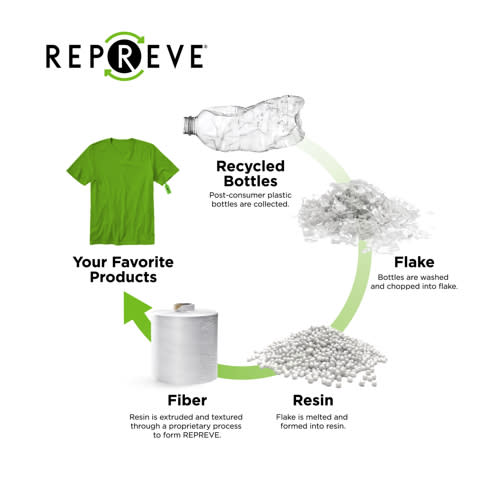What Repreve’s Lifecycle Analysis Discovered

Repreve, the recycled polyester brand that purposed over 35 billion water bottles into a virgin polyester substitute, announced today the results of its Life Cycle Analysis (LCA) study.
The Unifi-owned brand’s findings included a 42 percent reduction in greenhouse gas emissions compared to virgin filament yarn and 60 percent when compared to relative virgin staple yarns, as well as a 66 percent drop in abiotic depletion and fossil fuels. The analysis also found that Repreve reduces water scarcity by 76 percent and freshwater consumption by 67 percent.
More from Sourcing Journal
Ambercycle Teams With Bestseller, Tombogo on Regenerated Polyester
R&D Initiative Led by RadiciGroup Recycles Polyester for Sports Jerseys
“It’s really important that brands and retailers know they can trust what we’re selling and the LCA data is a pure example of why using sustainable products makes a difference,” Eddie Ingle, CEO of Unifi, told Sourcing Journal. “It’s all about carbon and what this study shows is that, when you use Repreve, you’re able to meet your sustainability targets quicker.”
Recycling a plastic bottle into fashion-friendly inputs is neither simple nor cheap, a concern that keeps some brands from adopting Repreve.


“You’ve also got the logistics cost of the production, washing the bottles and taking the labels off,” Ingle said. “The challenge [brands] have is a conflict between what the consumer will pay for and what are the input costs. But I think more and more of what these brands are saying is ‘I want a trusted supplier; I want something that’s transparent; I want something that is third-party verified, that has a lower carbon footprint.”
Ingle said that when it comes to the feel and performance of Repreve recycled polyester, it’s virtually indistinguishable from virgin, a “key selling point” when it started back in 2007 with Polartec and Patagonia among the yarn’s early adopters.
With carbon-fighting legislation already in force in the European Union and looming in the U.S., Ingle encouraged brands to make the switch to recycled inputs.
“We’re agnostic as to where the bottles go; we just want those to be used as raw material,” Ingle said. “That’s why our next phase is Textile Takeback where we can take [items] from the cutting room floor, or we can take a garment that’s been discarded and no longer useful and turn it back into a free polymer or free fiber, back into a garment.”
That makes transparency and traceability the name of the game, according to Meredith Boyd, Repreve’s senior VP of sustainability, technology and innovation.
“It’s important to share our LCA data to show the significant reductions Repreve offers in important environmental factors that participate in accelerating climate change,” Boyd said.
“We’re selling trust, at the end of the day,” Ingle added, pointing to Repreve user such as Chanel, H&M and Williams-Sonoma as major brands “moving forward in their sustainability journey.”

